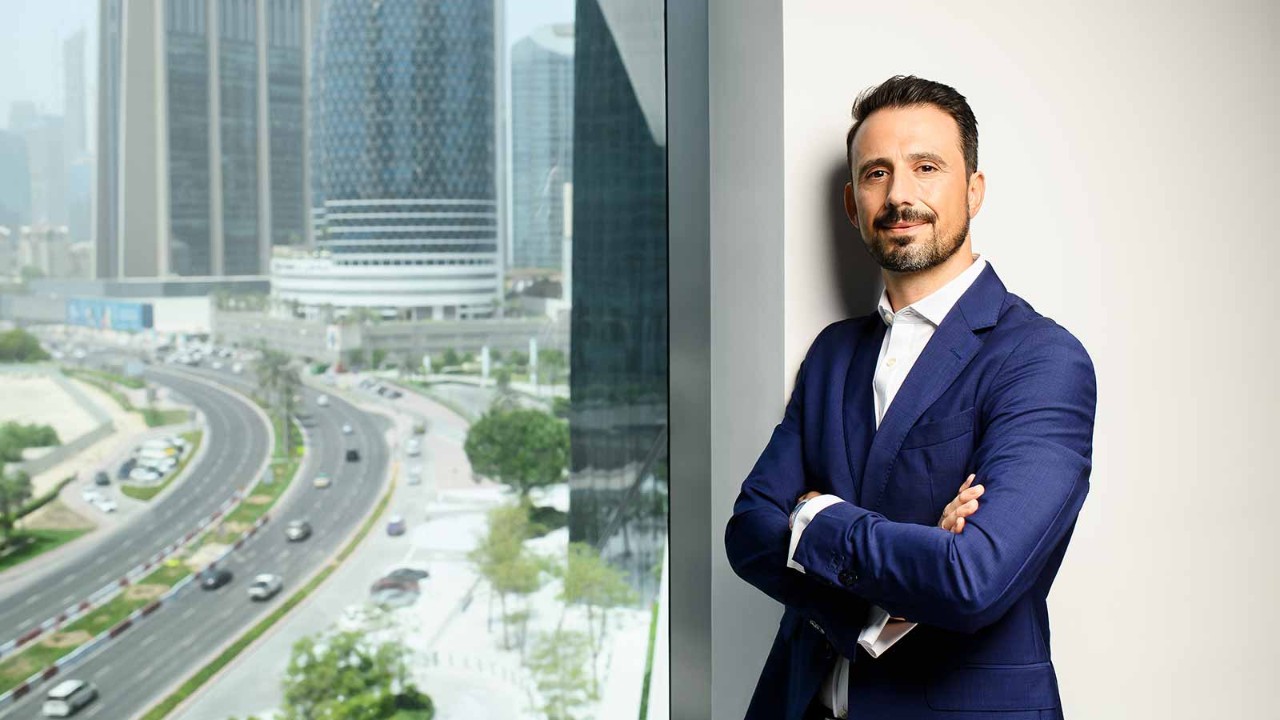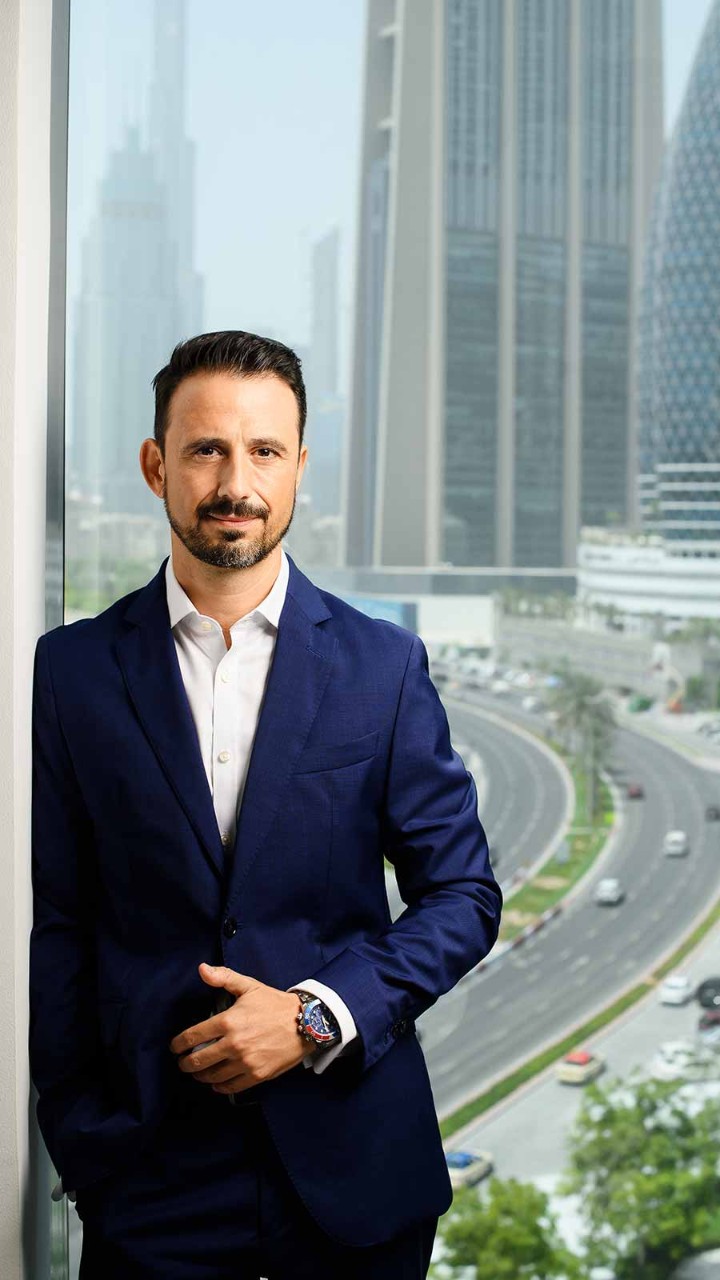
Climbing mountains is part of the day-to-day mindset for many finance professionals, but for Félix Manso García FCCA, the activity is more than a metaphor. ‘I love endurance sports,’ says the CFO for the Middle East region at Aon, the global risk, reinsurance and human capital services firm. Running ultra-trail races has taken him across more than 100km and involved 9,000m of climbing.
The extreme nature of these races has shaped García personally and professionally. ‘They require you to train your body and your mind, to develop the mental strength to push past limits and overcome challenges and fears,’ he says.
Ultra-trail has strengthened García’s discipline, focus, self-motivation and resilience, and competing in team races has allowed him to hone leadership techniques such as collaboration, motivation and support. ‘This has helped me enormously in my professional career.’ As has his ACCA Qualification. ‘Without it, I would not be in this CFO role,’ he adds.
Moving on up
A business administration degree from Complutense University of Madrid served García well for a decade. Then, after joining Aon, one of his managers encouraged him to gain a professional qualification. It was challenging – as well as working, García had a young family – and passing his ACCA exams didn’t transform his career overnight, but ‘since then, it has been a different journey for me,’ he says.
Just like an ultra-trail race, García’s 21-year career with Aon has covered some distance. He had senior finance roles in Spain and the UK before stepping up to become CFO in the Middle East. ‘I came in 2018 for two years, to cover a stress situation when a previous FD left the company,’ he says. Today, he is still there, but anticipates moving to another Aon assignment at some point and appreciates the prospect of changing roles and projects every few years.
‘Ultra-trail running requires you to train body and mind, to push past limits and overcome challenges and fears’
CV
2018
Middle East CFO, Aon, Dubai
2014
Director, EMEA finance, Aon, London
2011
Senior finance manager, EMEA/UK, Aon, London
2010
Manager accounting systems and processes, EMEA finance, Aon, London
2007
Deputy financial controller, Aon, Madrid
‘I am always learning and finding opportunities to keep growing at Aon, so I have not felt the need to move or look elsewhere,’ he says. ‘Aon’s model is highly focused on clients, growth and core values like integrity, trust, collaboration and resilience.’ It seems to combine well with the company’s approach to professional learning and cultivating leadership to support the development and transfer of skills and best practices.
Before his move to the Middle East, for example, García worked ‘hand in hand’ with Aon’s CFO in the UK, as EMEA lead on a working capital improvement project. ‘In one year, we unlocked more than US$10m in the UK alone, and Aon has started to replicate this,’ he says, liberating working capital in other regions. The experience sharpened García’s cash management focus and gave him insights into business leadership, influencing his own approach as a CFO.
Business partnering
In the Middle East, he directly manages a team of 30 people across Bahrain, Oman, Qatar, Saudi Arabia and the UAE, countries where Aon operates and has partners. ‘My role is partnering with the regional CEOs,’ he says. The task is complicated by the variety of legal and commercial arrangements across these countries and the presence of a CEO for each of Aon’s risk, retirement and health solution lines and for each type of client.
Among other things, this can mean multiple CEOs in a single country. ‘I am a board member in each entity and my role is to support them,’ he says, helping them to build opportunities to grow as a company and aligning them with what Aon wants to do. ‘Cash generation is high on my list,’ says García, whose past experience is doubly valuable, because some Aon clients in the region are very slow payers. ‘We need to make sure we get the cash into the business.’
The capital improvement project García worked on adopted a range of approaches to achieve this. ‘We better controlled teams and better negotiated agreements and contracts, to make sure cash was coming to the company much quicker.’
‘If my team are successful, I am successful. If they become ready to take on a more senior role, then I can move up as well’

Basics
1985
Aon sets up Middle East operation
5
Countries in which Aon Middle East operates: United Arab Emirates, Bahrain, Dubai, Oman, Qatar and Saudi Arabia
500
Employees in Aon Middle East – total Aon head count is 50,000, across 120 countries
4
Aon Middle East lines of business: commercial risk, health, reinsurance and human capital solutions
Full engagement
Accordingly, one of the areas he focuses on in the Middle East is deal engagement. ‘I need to make sure that the finance team is fully engaged, then spread this across most of the business units as much as I can.’
As well as improving working capital, this can help members of his finance team to understand the business better and develop their partnering skills – and García is keen to pass on what he’s learnt during his career. ‘I enjoy helping more junior members of my team,’ he says, coaching trainees and part-qualified colleagues with skills development, or mentoring and offering advice on how to shape their careers, which he sees as a win-win situation.
‘If they are successful, I am successful. If they grow and they become ready to take on a more senior role, then I can move up as well,’ explains the CFO, who has embedded this approach into the finance function. If a new Aon role beckons García back to Spain or the UK in the next year or so, he will be ready to depart and one of his team in the Middle East will be fully equipped to succeed him.
As well as supporting business partners and members of his team, García makes space around his day-to-day activities for accelerating innovation. Although some innovation projects are exclusively finance-related, such as improving efficiency by reducing the number of accounts in the chart of accounts, the CFO tries to focus on innovations that finance can take to the business. ‘From a finance professional standpoint, it’s a good way to partner.’
Looking beyond the finance department is vital, he says, if finance is to innovate in ways that benefit the business. ‘I try to make time in my weekly agenda to connect with my team and with other people who know more than I do, to learn from them and then apply this to real-case scenarios.’ One example is a data analytics initiative that will bring together information from clients and insurance companies to assist the business in various ways.
Tech does the transactional
In the future, García sees more finance professionals working more closely with the business, as they increase their use of and dependence on technology. ‘I think there is going to be much less transactional work and more collaboration and innovation work in the future,’ he says. ‘Some companies go faster than others, but at some point, as much as 70%–80% of financial transactions will happen automatically, through some sort of robotics.’
This is not the end of life as we know it for finance professionals, though. ‘It will mean that finance people can spend more time doing value-added work,’ he points out. This will demand more than strong technical skills – and ACCA can assist with this. ‘In my experience, it equips you to do much more than accounting,’ says the CFO, as the ACCA programme expands your understanding of business and ways that finance and financial information can support it more effectively.
For some members of García’s team in the Middle East, qualifying with ACCA is now included in their personal development plan, and almost all his team are involved in some sort of business partnering. ‘We push them to leave their comfort zone and their desk to have conversations with people in other parts of the business.’ As García can demonstrate, both personally and professionally, mountains are there to be climbed.




